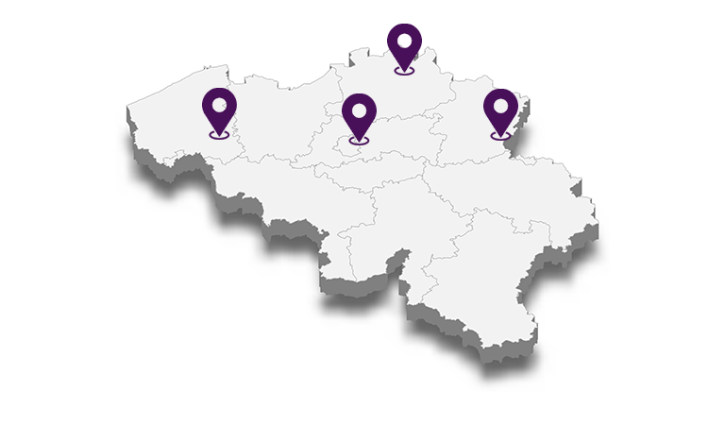Disclaimer. The English translations provided herein are generated by artificial intelligence from Dutch and French content. While every effort has been made to ensure accuracy, we cannot guarantee that the translations will be error-free. The translated content is for readability purposes only and should not be considered as legal advice. For accurate information, employers and HR professionals are advised to consult the original versions in Dutch or French, or to consult your Securex Legal Advisor.
Tax-on-Web is not yet available for personal income tax assessment year 2024 returns. As soon as it is, you will in principle receive a message about this in your e-box.
Please note that you can no longer use your "token" to log in to Tax-on-web. You can, however, log in with "Itsme" or your electronic identity card.
Bicycle allowance increased
In 2023 (income year), the bicycle allowance for employees and company managers was only tax and socially exempt if it did not exceed EUR 0. 27 per kilometre actually travelled by bicycle in commuting.
Since 1 January 2024, this amount has increased to €0.35 per kilometre.
Moreover, for last year, you can still combine the bicycle allowance exemption with the deduction of actual expenses. Make the most of this, because from 2024 (assessment year 2025), this is no longer possible!
To prevent abuse, the bicycle allowance will henceforth be exempt only if the employee opts for the flat-rate deduction for professional expenses on his tax return.
For employees or company directors who decide to account for their actual costs, the bicycle allowance is now taxable as professional income.
Read more in our news article of 24 October 2023 (available in Dutch or French)
Maximum amount of net means of subsistence of dependent children increased
The maximum amount of income a child can earn while remaining a tax dependent of the parents has been increased for 2023 and 2024.
Moreover, this upper limit is now the same for all children, regardless of the marital status of their dependent parent (single, married or legally cohabiting).
The upper limit of net means of subsistence was thus raised to €7 010 for 2023 (assessment year 2024) and €7 290 for 2024 (assessment year 2025).
This measure follows the increase in the annual cap on student work hours from 475 to 600 hours for 2023 and 2024.
The award period of the purchasing power premium has been extended to 31 March 2024
Did you grant your employees a purchasing power premium in the form of consumption vouchers in 2023? Under certain conditions, the purchasing power premium is exempt from withholding tax and social security contributions. Only an employer's contribution of 16.5% is due on this premium.
If your company made "high profits" or "exceptionally high profits" in 2022, you can grant your employees a purchasing power bonus.
Initially, this premium was to be granted by 31 March 2023 at the latest. However, the government has decided to extend this deadline to 31 March 2024 by royal decree.
However, this royal decree only deals with the NSSO benefit scheme for the purchasing power premium.
A draft law stipulates that purchasing power premiums granted after 31 December 2023 can also be exempted from withholding tax from now on provided that:
- The allocation of the purchasing power premium is included in a collective bargaining agreement concluded no later than 31 December 2023
- And the purchasing power premium will be spent in the period from 1 January to 31 March 2024.
The return form for the assessment year 2024 includes a new subheading 12 to list the "Purchasing Power Premium eligible for exemption" granted in 2023.
This premium is also limited to 750 euros per employee. If an employee received purchasing power premiums spread over two taxable periods (2023 and 2024), the maximum amount of 750 euros applies to both taxable periods together.
This measure is not yet official. We will keep you updated on its further evolution.
Read more in our news article from 22 February 2024 (available in Dutch or French)
280 overtime with overtime for road and rail works
The maximum amount of tax-favoured overtime will soon be increased to 280 hours for employees and employers performing road and railway works. However, employers are required to use an electronic attendance recording system.
Under certain conditions, a certain amount of overtime with overtime pay entitles both the employer and the employee to a favourable tax scheme.
- For you as an employer, this favourable arrangement consists of an exemption from paying withholding tax on wages for those overtime hours worked by certain categories of employees.
- Your employee can count on a reduction of withholding tax on this salary.
The maximum number of advantageous overtime hours is set at 130 per year and per employee (general quota).
However, this upper limit was temporarily increased to 180 overtime hours in 2019 and 2020, and then again from 1 July 2021 for all sectors. The Social Agreement 2023-2024 also provides for an extension of this increase until 30 June 2025.
In the construction sector, the upper limit had already been raised to 180 hours, provided the site actually uses an attendance recording system. However, this condition need not be met during periods when the overall quota is temporarily increased to 180 hours.
Finally, the upper limit in the hospitality industry is 360 overtime hours.
This measure is not yet official. We will keep you informed as soon as it is published in the Belgian Official Gazette.
Read more about this measure our news article from 10 April 2024 (available in Dutch or French)
Reintroduction of relance hours from 1 July 2023
Relance hours have been reintroduced for the period from 1 July 2023 to 30 June 2025.
From 1 July 2023 to 30 June 2025, employees are allowed 120 additional voluntary overtime hours per calendar year, known as "relance hours". These relance hours are in addition to the basic quota of 100 voluntary overtime hours, which also applies in all sectors.
The government introduced a scheme during the coronavirus pandemic that allowed 120 extra overtime hours per year in several essential sectors under tax-friendly conditions. These overtime hours are known as "relance hours".
The 2021-2022 interprofessional agreement had already extended the measure to all sectors for the period from 1 July 2021 to 31 December 2022, so the relance hours were no longer applicable from 1 January 2023. Last year, the measure was reintroduced to all sectors for the period from 1 July 2023 to 30 June 2025.
Specifically, no overtime pay or catch-up rest is due for relance hours. Moreover, those overtime hours are exempt from both social contributions, withholding tax and personal income tax. In other words, gross pay for these hours is the same as net pay.
In the declaration form for the assessment year 2024, overtime can be declared in box IV, section A, subheading 11(a). Company executives get the same benefit. They should declare their voluntary overtime in box XVI, section 6, (a).
The unused exemption for overtime worked in 2021 and/or 2022 and not paid until 2023 can still be claimed in the old sections 11.b and c of box IV (6.b and c of box XVI for company managers).
However, the exemption can no longer be claimed for overtime worked in 2020, even if the hours were paid in 2023.
Copyright less advantageous
Subject to certain conditions, income from remuneration for the transfer or licensing of copyright or related rights is subject to a favourable tax regime.
If such income does not exceed a certain upper limit, it is taxed as withholding income. They are then not subject to withholding tax but to withholding tax at a favourable rate of 15%, after deduction of actual and flat-rate expenses.
There was a major reform of the copyright regime in 2023. The finance minister wanted to limit the scope and cap on copyright, to prevent abuse.
From now on, only holders of an artwork certificate will be eligible for the preferential regime for movable income.
Although no sector is explicitly excluded from the copyright regime, its scope of application was severely limited. As a result, the regime will disappear for a large number of professions. However, those professions will be subject to a one-year transition period from 1 January 2023, before the reform takes full effect.
The declaration form takes into account the new copyright tax regime from 1 January 2023. Income falling under the new regime can be declared in box VII, section D, subsection 1. Income eligible for the transitional regime should be declared in subheading 2.
Read more: 'Copyright reform: the law was published' (available in Dutch or French)
Securex helps you
You can find the preparatory document for the personal income tax returnon the FPS Finance website.
The deadlines for filing returns for the assessment year 2024 (income year 2023) are not yet known. We will notify you via Lex4You as soon as they are announced.
Source
- Royal Decree of 17 March 2024 establishing the model of the personal income tax return form for the assessment year 2024, Belgian Official Gazette of 22 March 2024






